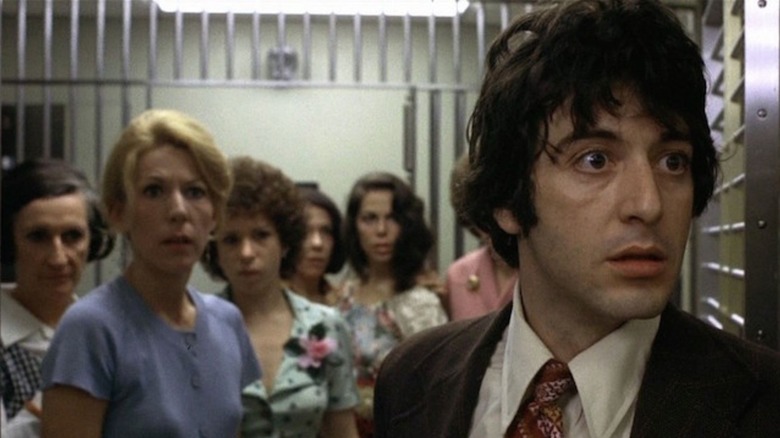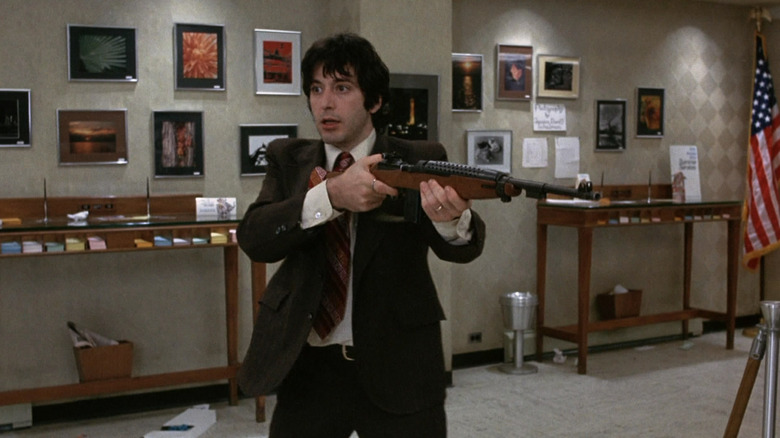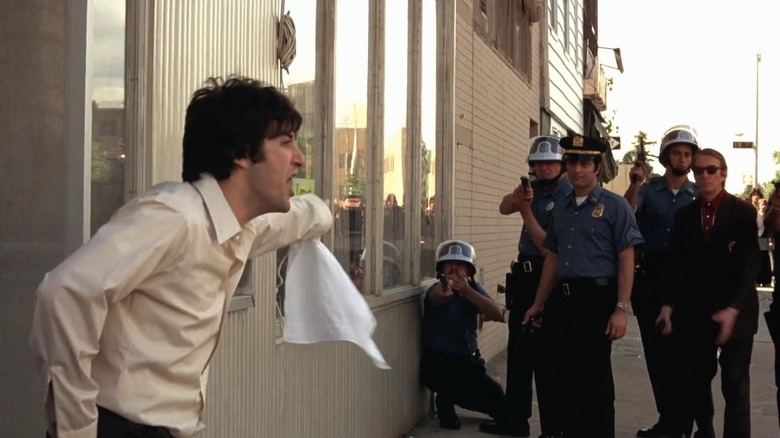Sidney Lumet Sacrificed Dog Day Afternoon's Score For The Sake Of The Story
"Dog Day Afternoon" is a phenomenal piece of 1970s American cinema based on the true story of unsuccessful bank robber John Wojtowicz. In the film, on August 22, 1972, Sonny Wortzik and friend Sal Naturile fail to take the money and run, instead ending up in a showdown with law enforcement and becoming local celebrities. Director Sidney Lumet crafts "Dog Day Afternoon" with a documentary-style realism through the use of natural lighting, lack of flashy angles, and actor improvisation. He often shoots in real time to capture the sense of authenticity as much as possible, to showcase the wild events as they unfold in real time.
Most significantly, Lumet strips "Dog Day Afternoon" of any musical score, other than three songs that come from characters' radios. The absence of supporting music defies traditional Hollywood storytelling. Lumet elaborates on the decision in the DVD commentary track:
"The reason for no music is that, as you'll see from the story that develops here, this truly happened. It was so important to me that the audience believe it really happened because what happened was so outrageous, and I could not reconcile trying to convince an audience that this really happened — which I felt was the first obligation of the movie — with putting a music score in. How would it have felt if suddenly in the midst of a sequence you heard an orchestra?"
Lumet's choice to not include music impacts the film in fascinating ways.
The lack of music turns up the emotional heat
Sidney Lumet wanted "Dog Day Afternoon" to be a record of events as they transpired over the course of a single summer day, not an interpretation of them. He felt using orchestral music to evoke specific emotions in the audience would be too manipulative. His erasure of music immerses the audience in the craziness of what really happened.
Without music, the frenetic dialogue and the actors' emotional intensity serves as the score. Al Pacino, John Cazale, Chris Sarandon, Charles Durning, and the rest of the ensemble allow their dynamic voices to compose moments of openhearted confessions, exasperation, black humor, and rallying cries of "Attica!" A traditional score would have only taken away from the musicality to their crackling conversations and monologues. The removal of music also allows for awkward pauses and breaks in discussion to breathe and play out as they would if you were actually there.
However, "Dog Day Afternoon" is not totally devoid of music. There is one brief but crucial use of soundtrack music.
An Elton John song overlays the opening scene
"Dog Day Afternoon" opens with Elton John's "Amoreena," about someone yearning for their faraway sweetheart. The song has a pleasant, country rock style, and John's pleasant voice sounds like a soft summer day. Its honeyed sound and flowery lyrics of bright cornfields, crystal streams, songbirds, and sycamores starkly oppose the urban images we see in the opening montage: dogs rooting through garbage, crossing ferries, homeless people, construction workers, traffic, the Manhattan skyline.
Originally, the footage was silent, but Sidney Lumet explained on the DVD commentary that editor Dede Allen would play "Amoreena" over the sequence, and he liked it so much he kept it. Lumet connected the song to Sonny's getaway car radio parked outside of the bank in the montage's final shot.
Perhaps Elton John's sentimental song evokes the sunny countries Sonny dreams of escaping to, brighter places away from the grime of the city (or Wyoming, as Sal densely suggests). "Amoreena" stands out in a film that has no classic score. Lumet's elimination of music in "Dog Day Afternoon" absorbs the viewer in the story and the heat of every electrifying moment.


